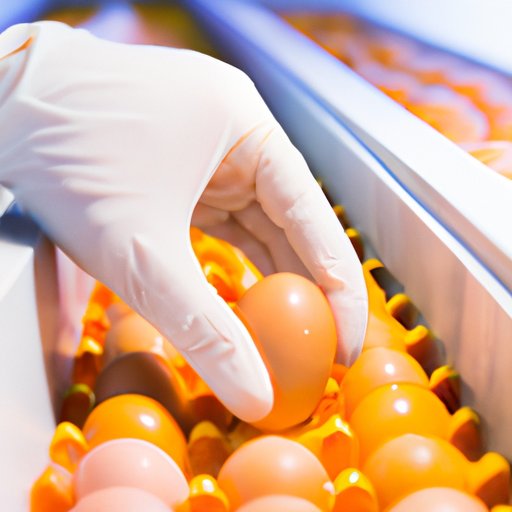
Introduction
Eggs are a staple in kitchens everywhere, but they can quickly go bad if they are not fresh. It can be challenging to determine if an egg is still good to eat, especially if it has been sitting in your refrigerator for a while. Luckily, there are several easy ways to test for egg freshness, and this article will guide you through the top methods.
The Float Test: Exploring the Classic Method for Testing Egg Freshness
One of the oldest, most classic methods for testing egg freshness is the float test. This method determines freshness by measuring the size of the air cell in the egg. The air cell grows larger as the egg ages, so a small air cell means that the egg is fresher. To perform the float test, follow these steps:
1. Fill a bowl with cold water.
2. Gently place the egg in the water.
3. If the egg sinks to the bottom and lays flat on its side, it is fresh.
4. If the egg sinks but stands on its point, it is still good but not as fresh.
5. If the egg floats, it is not fresh and should be discarded.
Advantages of the float test include its simplicity and speed. However, the test is not perfect and can give inconsistent results. Factors such as the temperature of the water, the size of the egg, and the grade of the egg can all affect the results.
Discovering the Science Behind Egg Freshness: Tips for Accurately Testing Your Eggs
To accurately test for egg freshness, it is essential to understand the science behind it. Egg freshness is determined by the size of the air cell, the quality of the egg white, and the tightness of the yolk. As an egg ages, the air cell grows larger, the egg white becomes thinner and more runny, and the yolk becomes less firm.
Factors that affect egg freshness include temperature, humidity, and movement. Eggs that are exposed to high temperatures and humidity will age more quickly, while eggs that are kept still will last longer. Other methods for testing egg freshness include the candling method, where a light is shone through the egg to examine its contents, and the cracked egg test, where the egg is cracked open to examine the quality of the yolk and egg white.
Properly storing eggs can also extend their freshness. Keep eggs in their original carton in the refrigerator’s main body, not in the door, where there is more temperature fluctuation.
From Color to Smell: Quick and Easy Ways to Test the Freshness of Your Eggs
There are several visual and sensory cues to help gauge egg freshness. The eggshell’s color can offer a clue, with fresher eggs having a brighter white and a yolk that sits higher and looks more rounded. Checking for odor is another quick method to test for egg freshness. Fresh eggs have little to no smell, while older eggs emit a sulfur-like odor.
Another sensory test is to listen to the egg. If you shake an egg and hear a sloshing sound, it is likely not fresh. Lastly, touching the egg can help determine freshness. A fresh egg should feel firm and solid to the touch, while a less fresh egg will feel more squishy.
Mastering the Art of Picking Fresh Eggs: A Step-by-Step Guide to Testing Your Eggs
Choosing the freshest eggs is essential, and there are several things to look for when selecting eggs at the store. Begin by examining the egg carton to ensure there are no cracks or deformities.
Next, gently pick up each egg and check for firmness. A fresh egg will feel sturdy and firm, while a less fresh egg will feel loose and jiggly. Lastly, inspect the eggshells for cracks or damage, as this can be a sign that the eggs are damaged or have been sitting around for a while.
Ensuring the longevity of your fresh eggs is just as critical as testing them for freshness. Proper storage is key, but it is also best to use the oldest eggs first. Consider marking the carton or egg with the purchase date to help keep track of which eggs to use first.
How Long Do Eggs Last? Expert Tips and Tricks for Evaluating Egg Freshness
The shelf life of eggs varies depending on various factors. Generally, eggs can last up to five weeks from the date they were laid, assuming they have been stored correctly. To tell if an egg is still good to eat, perform a crack test. Crack the egg open onto a plate and inspect the yolk and egg white. A fresh egg will have a tight yolk and firm egg white, while an old egg will have a runny egg white and a yolk that sits flat.
If you’re unsure whether an egg is safe to eat, discard it. It’s always better to be safe than sorry when it comes to consuming potentially contaminated food.
Conclusion
Accurately testing for egg freshness can be done quickly and easily using a variety of methods. From the classic float test to sensory tests like color and smell, understanding how to test for egg freshness is essential for maintaining food quality standards. Remember to look for the freshest eggs at the store, store them properly, and use the oldest eggs first. With these tips and tricks, you’ll always have fresh, quality eggs on hand.





